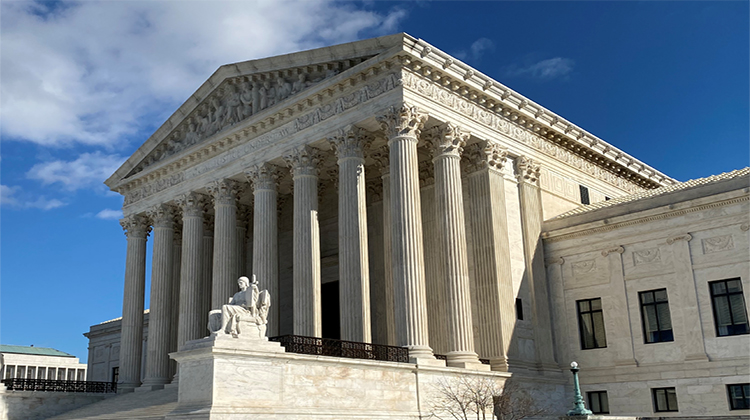[ad_1]
In one of many greatest circumstances of the present time period, the Supreme Court docket’s calendar for January 2024 options arguments in regards to the restrict of federal regulatory powers.
 In all, there are 9 units of arguments listed for the January session, which lasts from Jan. 8-17. However essentially the most consideration will probably be targeted on the ultimate two arguments in a possible landmark ruling on the Chevron doctrine precedent.
In all, there are 9 units of arguments listed for the January session, which lasts from Jan. 8-17. However essentially the most consideration will probably be targeted on the ultimate two arguments in a possible landmark ruling on the Chevron doctrine precedent.
Hyperlink: Learn Arguments Schedule
In Loper Brilliant Enterprises v. Raimondo (22-451) and Relentless v. Division of Commerce (22-1219), the justices will settle an argument involving industrial fishing which will have broader implications for the Chevon doctrine.
The authorized idea of the Chevron doctrine, or Chevron deference, dates again to a 1984 Supreme Court docket resolution, Chevron U.S.A., Inc. v. Pure Assets Protection Council, Inc. Beneath Chevron, if a federal statute is ambiguous, courts ought to defer to a federal company’s interpretation of the statute whether it is deemed cheap. A number of present justices, nevertheless, have overtly questioned the constitutional foundation of the Chevron doctrine and thru these two new circumstances, might search to determine a brand new precedent to interchange it.
In Loper Brilliant Enterprises and Relentless, a bunch of fisherman and small fishing firms are difficult the flexibility of the Nationwide Marine Fisheries Service to require fishing vessel operators to pay the salaries of the federal observers who oversee the vessels’ operations whereas at sea. The vessel operators need the court docket to resolve if the company has assumed powers underneath the Chevron doctrine to drive compliance, or to overturn the doctrine altogether.
The particular query in entrance of the justices leaves little doubt of the choice’s potential significance: “Whether or not the Court docket ought to overrule Chevron or at the least make clear that statutory silence regarding controversial powers expressly however narrowly granted elsewhere within the statute doesn’t represent an ambiguity requiring deference to the company.”
There are a number of different circumstances of word in January.
On Jan. 9, the Court docket will hear arguments in Sheetz v. County of El Dorado, CA (22-1074). El Dorado County charged George Sheetz, the builder of a “modest manufactured home,” a financial exaction payment of $23,420 to assist finance unrelated highway enhancements. Sheetz claims the county didn’t decide the payment had an “important nexus” and “tough proportionality” to the purported impacts related together with his modest building mission, in battle with two prior Supreme Court docket choices. The county says its actions had been licensed by laws.
On Jan. 16, the Court docket will hear arguments in Devillier v. Texas (22-913) in a dispute about deciphering the Fifth Modification’s Takings Clause. This case got here out of a sequence of inverse condemnation circumstances filed in Texas by a bunch of native landowners alleging a state freeway mission had precipitated widespread flooding and disadvantaged them of the financial worth of their property. The property house owners sought damages and Texas claimed no state legislation allowed for the house owners to hunt simply compensation for his or her losses. The house owners declare the Fifth Modification’s Takings Clause is “self-executing” and no state motion is required.
And on Jan. 10, in Smith v. Arizona (22-899), the justices will contemplate an utility of the Sixth Modification’s Confrontation Clause, which reads that “In all felony prosecutions, the accused shall get pleasure from the suitable … to be confronted with the witnesses towards him.” In an Arizona drug possession case, a forensic analyst who carried out drug checks was now not employed by the state, and testimony was provided by a substitute knowledgeable. The questions are whether or not the prosecution might current testimony by a substitute knowledgeable if (a) the testifying knowledgeable presents some impartial opinion and the analyst’s statements are provided not for his or her fact however to clarify the knowledgeable’s opinion, and (b) the defendant didn’t independently search to subpoena the analyst.
Along with January arguments, a number of different occasions will possible draw consideration to the Supreme Court docket. The request from Particular Prosecutor Jack Smith for the justices to contemplate a fast-track attraction of a ruling about former President Donald Trump may very well be in play, in addition to the appeals course of within the latest Colorado Supreme Court docket resolution in regards to the 14th Modification and Trump’s place on that state’s major poll. Additionally, the Court docket often pronounces in mid-January its remaining lists of petitions accepted for arguments throughout its present time period.
Scott Bomboy is the editor in chief of the Nationwide Structure Middle.
[ad_2]
Source link




